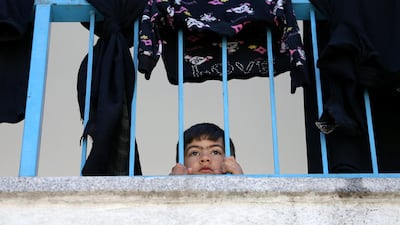Israeli Prime Minister Benjamin Netanyahu said on Wednesday that Israel is pursuing "forceful deterrence" against the Hamas militant movement that controls Gaza.
This came as as Palestinian President Mahmoud Abbas said Israeli bombardments of Gaza are tantamount to war crimes.
On Wednesday, Israeli air strikes killed at least six people, including a journalist, across the Gaza Strip and destroyed the home of an extended family.
Since May 10, at least 219 Palestinians have been in killed in Gaza alone – including 64 children and 36 women – and 12 people in Israel, including 10 killed by rockets, according to authorities on each side.
Despite growing international pressure for a ceasefire, the Israeli military said it had widened its strikes on targets in the Palestinian territory's south to reduce continuing rocket fire from Hamas.
However, an Israeli military source also said it is evaluating whether its objectives have been achieved.
“We want peace not war but we will not relinquish the rights of our people,” Mr Abbas said in a televised speech from Ramallah, in the West Bank.
Meeting with foreign ambassadors on Wednesday, Mr Netanyahu said “you can either conquer them [Hamas], and that’s always an open possibility, or you can deter them.”
“We are engaged right now in forceful deterrence, but I have to say, we don’t rule out anything.”
In the town of Khan Younis, in southern Gaza, an air strike destroyed the home of 40 members of the extended Al Astal family. They said a warning missile hit the building five minutes before the main air strike, allowing everyone to escape.
Ahmed Al Astal, a university professor, described a scene of panic before the air strike, with men, women and children racing out of the building.
He said some of the women did not even have time to cover their hair with headscarves.
“We had just got down to the street, breathless, when the devastating bombardment came,” Mr Al Astal said.
“They left nothing but destruction, the children’s cries filling the street. … This is happening, and there is no one to help us.
"We ask God to help us.”
Nearly 450 buildings in densely populated Gaza have been destroyed or badly damaged, including six hospitals and nine primary care health centres, and more than 52,000 Palestinians have been displaced, the UN humanitarian agency said.
The damage has left large craters and piles of rubble across the coastal enclave, and deepened long-running concerns about living conditions in Gaza.
Israel has carried out hundreds of air strikes against what it says are militant targets in Gaza since May 10. Hamas and other militants have fired more than 3,700 rockets at Israel.
Mr Netanyahu said Israel is doing everything it can to avoid civilian casualties.
In remarks reported by Israeli media, he was quoted as saying: "We're not standing with a stopwatch. We want to achieve the goals of the operation. Previous operations lasted a long time so it is not possible to set a time frame."
"We try to target those who target us, with great precision," Mr Netanyahu told the foreign envoys.
"As surgical an operation as it is, even in a surgical room in a hospital you don't have the ability to prevent collateral damage around affected tissue. Even then you can't. And certainly in a military operation you cannot."
Meanwhile, a military source told AFP that Israel is studying whether conditions are right to stop bombing Palestinian extremists in Gaza but is preparing for "more days" of strikes if necessary.
"We are looking at when is the right moment for a ceasefire," said the source, amid an international diplomatic push to broker a truce after 10 days of bloodshed.
But Israel was now evaluating whether its objective of degrading the capabilities of Gaza's Hamas rulers had been achieved, the military source said, and "whether Hamas understands the message" that its rocket barrages towards Israel cannot recur.

